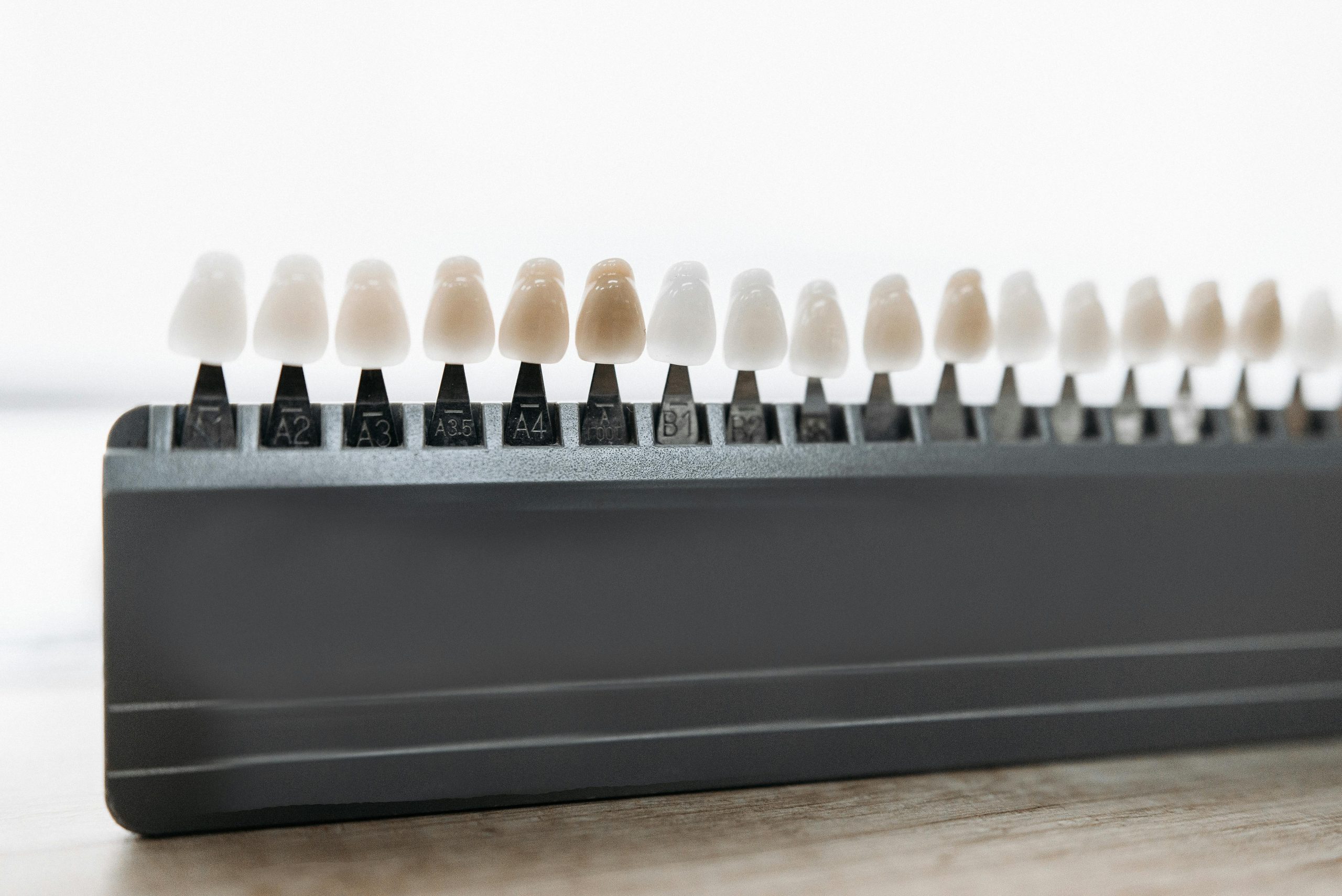
Veneers have become one of the most popular cosmetic dentistry treatments for achieving a picture-perfect smile. They can fix discoloration, chips, gaps, and other imperfections quickly and effectively. But if you’re thinking about investing in them, you probably have one big question: How long do veneers last?
The answer depends on several factors—including the type of veneer you choose, how well you care for them, and your overall dental health. In this article, we’ll dive deep into the lifespan of porcelain vs. composite veneers, what affects their durability, and how to make them last as long as possible.
What Are Veneers and Why Do People Get Them?

Veneers are thin, custom-made shells that bond to the front of your teeth. They’re designed to improve the appearance of your smile by changing the color, shape, and size of your teeth. Unlike crowns, which cover the entire tooth, veneers only cover the visible front surface.
People choose veneers because they can correct:
- Deep stains that whitening treatments can’t fix
- Chips and cracks from wear or accidents
- Gaps between teeth
- Minor misalignments or uneven edges
- Teeth that look too small or irregularly shaped
They’re like a cosmetic facelift for your smile, offering a natural-looking and long-lasting solution without major dental surgery.
How Long Do Veneers Last on Average?
The lifespan of veneers varies based on the material used:
- Porcelain veneers typically last 10 to 20 years.
- Composite veneers usually last 5 to 7 years.
These are averages, not guarantees. With excellent care, some porcelain veneers can last well beyond 20 years, while poorly maintained composites may need replacing sooner.
What’s the Difference Between Porcelain and Composite Veneers?
The two main types of veneers differ in material, application process, and longevity.
Porcelain Veneers: The Long-Lasting Choice
- Made from high-quality ceramic
- Custom-fabricated in a dental lab for a perfect fit
- Highly resistant to staining and chipping
- Mimic the translucency of natural enamel
Composite Veneers: The Budget-Friendly Option
- Made from tooth-colored resin applied directly to teeth
- Usually completed in a single visit
- Easier to repair if chipped
- More affordable, but less durable and prone to staining
Understanding these differences is key to knowing how long each type will last and which one best suits your needs.
How Long Do Porcelain Veneers Last?
Porcelain veneers are often considered the gold standard in cosmetic dentistry. Their average lifespan is 10–15 years, but with proper care, many patients enjoy them for 20 years or more.
Why Do They Last So Long?
- Porcelain is a strong and durable material.
- It resists stains from coffee, wine, and other dark foods.
- It maintains its shine and appearance over time.
When Do Porcelain Veneers Need Replacing?
You may need to replace porcelain veneers if they become chipped, cracked, or loose—or if your gums recede significantly. Regular dental visits will help your dentist monitor their condition.
How Long Do Composite Veneers Last?
Composite veneers typically last 5–7 years, making them a shorter-term solution. Some may last longer with great care, but they don’t match porcelain in durability.
Why Is Their Lifespan Shorter?
- The resin material is softer and more prone to wear.
- Composite is more susceptible to staining from food, drinks, and smoking.
- They can chip or break more easily than porcelain.
When Are Composite Veneers a Good Idea?
They’re great if you:
- Want a more affordable cosmetic option
- Prefer a less invasive procedure
- Need a temporary fix before committing to porcelain
What Factors Affect How Long Veneers Last?

Even the best veneers won’t last forever, but several factors influence their lifespan:
- Oral Hygiene Habits: Brushing twice daily and flossing help prevent decay and gum disease, which can affect veneer longevity.
- Dental Health: Healthy underlying teeth and gums support veneers better than compromised ones.
- Diet Choices: Excessive consumption of staining foods and drinks—like coffee, tea, and red wine—can discolor composites (though porcelain resists most stains).
- Bite Habits: Chewing on ice, biting nails, or using teeth as tools can chip veneers.
- Teeth Grinding (Bruxism): Grinding puts pressure on veneers, causing cracks or loosening. A night guard can help protect them.
- Quality of Dental Work: A skilled cosmetic dentist using high-quality materials ensures better fit, comfort, and durability.
How Can You Make Veneers Last Longer?
Proper care is the secret to maximizing veneer lifespan. Here’s how:
- Practice excellent oral hygiene: Brush twice daily with a soft-bristled toothbrush and non-abrasive toothpaste.
- Floss regularly: Prevents plaque buildup around the veneer edges.
- Avoid hard objects: Don’t chew ice, pens, or hard candies.
- Wear a night guard: If you grind your teeth, protect veneers with a custom guard.
- Schedule regular dental checkups: Professional cleanings and exams catch problems early.
- Limit staining foods and drinks: Especially important for composite veneers.
These habits not only preserve veneers but also maintain your overall oral health.
Do Veneers Ever Need Maintenance or Repair?
Yes, even with great care, veneers may need occasional maintenance.
- Composite veneers can be polished to restore shine and repaired if chipped.
- Porcelain veneers cannot be repaired easily; they usually need full replacement if damaged.
Your dentist will check your veneers during routine visits and recommend repairs or replacements if necessary.
Can You Whiten Veneers If They Get Stained?
Unfortunately, whitening treatments don’t work on veneers.
- Porcelain veneers rarely stain, so this isn’t a big issue.
- Composite veneers can discolor over time but require polishing or replacement, not whitening.
If you’re planning to whiten your natural teeth, do it before getting veneers so they match your desired shade.
What Happens When Veneers Need to Be Replaced?
When veneers reach the end of their lifespan, they’re removed and replaced with new ones. For porcelain veneers, this is a permanent commitment because enamel was removed during the initial procedure. Composite veneers may be easier to replace or transition from.
Replacement usually involves:
- Removing the old veneer
- Cleaning and preparing the tooth surface
- Taking impressions for the new veneer
- Bonding the new veneer in place
Porcelain vs. Composite Veneers: Which Should You Choose?
Choosing the right veneer depends on your goals, budget, and willingness to commit to long-term care.
| Feature | Porcelain Veneers | Composite Veneers |
| Lifespan | 10–20 years | 5–7 years |
| Cost | Higher | Lower |
| Appearance | Most natural, stain-resistant | Good, but prone to staining |
| Procedure | Requires multiple visits | Usually one visit |
| Reversibility | Irreversible | Less invasive, easier to remove |
| Maintenance | Low, mostly routine care | May need more frequent repairs |
If you’re after a long-term, premium solution, porcelain veneers are the way to go. If you want something affordable and quick, composite veneers fit the bill.
FAQs About Veneer Lifespan
Q: Do veneers fall off easily?
Not if they’re bonded correctly. However, poor bonding or habits like grinding can cause them to loosen.
Q: Do veneers hurt to get?
The procedure is generally painless, with minor sensitivity afterward.
Q: Can veneers last a lifetime?
They’re not permanent, but porcelain veneers can last decades with great care.
Q: Do you still need to brush veneers?
Yes! Veneers don’t decay, but the underlying teeth and gums still need protection.
The Bottom Line
So, how long do veneers last? The answer depends largely on the material you choose and how well you care for them. Porcelain veneers are a long-term investment, often lasting 10 to 20 years or even longer with proper care, while composite veneers provide a more affordable but shorter-term solution, usually lasting 5 to 7 years.
Ultimately, the right choice comes down to your budget, dental health, and how committed you are to maintenance. By working with a skilled cosmetic dentist and following good oral care habits, you can enjoy a stunning, confident smile that lasts for many years.


